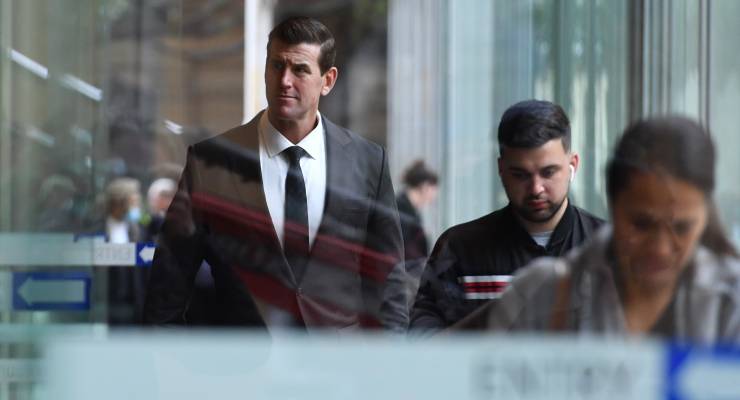
When giving interviews on high-profile defamation cases, journalists commonly ask, “How significant is this case?” Lawyers approach that question with the law in mind. Did the case change the law?
With respect to Ben Roberts-Smith’s lawsuit, the legal answer is anticlimactic: we don’t know yet. The reasons for Justice Besanko’s decision have been suppressed while government lawyers ensure they wouldn’t undermine our country’s national security interests. We will know more in a few days.
The case likely won’t be legally interesting. It seems to have turned on some settled principles. For example, you won’t win in a defamation claim if the person you are suing proves that what they said about you was substantially true. This “justification” defence is enshrined in statutes in force throughout Australia.
With respect to the most serious allegations, that’s what the media respondents did here. For example, they proved, on the balance of probabilities, that the allegation “BRS kicked a man off a cliff” was substantially true. In fact, the court decided that most of the “imputations” — the meanings carried by the articles about BRS — were substantially true.
The court did not find that all the imputations were substantially true. The media respondents failed in their justification defences with respect to allegations of domestic violence. They did ultimately succeed even on those domestic violence allegations, however, through another defence imputation’s “contextual truth”.
The contextual truth defence is tricky, but it means the publications carried meanings other than those about the domestic violence that BRS sued upon, those other meanings hurt BRS’ reputation more than the domestic violence imputations, and those other meanings were substantially true.
Even if the case is not legally interesting, of course, it was still interesting. Let’s not kid ourselves why.
This was a soap opera for politics and law nerds, a WWE main event with pleadings and particulars rather than piledrivers and powerbombs. Watching a national hero fall from grace was MAFS-esque. We just gasped together as we watched the season finale — the babyface turned heel!
Of course, media people are absolutely frothing over the outcome. Nine’s managing director James Chessell went so far as to call the judgment “a pivotal moment in history”. Puh-lease. Your guys won, but that’s a bit dramatic.
This decision will cause some cash to move between media organisations’ bank accounts. Seven Network chairman Kerry Stokes, who bankrolled the BRS case, is probably pretty bummed out, sitting in one of his multimillion-dollar homes quaffing whatever rich guys quaff.
Fair bump, though: if the media respondents end up getting indemnity costs, the court order to follow could dwarf Australia’s largest defamation damages awards.
Real accountability will come through legal fora other than this defamation circus. The Brereton Report was a bigger deal: it was commissioned in 2016, years before the publication of the articles that BRS sued over.
So is the case that significant? It shows defamation law is perhaps not as great a threat to public interest journalism that some may suggest. Journalists were willing to put their necks on the line before this case; they would back themselves to defend defamation litigation.
The BRS judgment may embolden some in the media to speak truth to power. They can do so knowing that they will have the shield of a new defence of “publication of matter concerning issue of public interest” that is now in force throughout much of Australia. That defence was not in force at the key times for the BRS case, and the media won anyway.
The biggest impact of this case may be what it does for the psychology of would-be defamation plaintiffs.
Back in 2003, Barbara Streisand was upset that her Malibu mansion was being photographed. She sued to protect her privacy and suppress publication of the photo. In doing so, she just drew attention to the photo’s existence, spawning the term the “Streisand Effect”: a shorthand for the unintended consequences of attempting to suppress something.
Ben Roberts-Smith’s case is significant: it is the new archetype of the risks associated with suing for defamation. The case became a platform for the media to perform a public execution of his character. Had he just said, “It is all lies, I am not going to give this coverage dignity by discussing details”, perhaps the world would have moved on.
Commencing this action was a political miscalculation by BRS and a poor business decision by those who helped him pay for it. The legacy will be the “Roberts-Smith Effect”: when suing in defamation makes your reputation even worse.








The reasons for Justice Besanko’s decision have been suppressed while government lawyers ensure they wouldn’t undermine our country’s national security interests.
Is it just me or do others find this somewhat disturbing? I am not at all convinced that Australia’s best interests are being served by government lawyers deciding whether we should be allowed to read the full findings of a Judge. It’s this kind of attitude that has got us into the present appalling situation of defending the armed services.
And the emergence of secret trials and imprisonments, something we condemn other countries for doing.
Yes, disturbing and disgusting
I wonder if Zachary Rolfe will find a new mentor now? Interesting also that Ben Roberts-Smith was a privileged product of the same exclusive boys school in Perth attended by Christian Porter.
These guys all seem to have a lot in common. They have all presented themselves with extreme self-confidence, convincing others to believe in them, follow them and support them. Parents who bestow on them privilege, wealth and powerful contacts. Might we conclude that this brings a sense of entitlement and a belief that the rules don’t apply to them, or even that they are above the common-folk and thus protected from the consequences of their actions? They are all having to reconsider any such belief, as they’ve all been damaged by their actions.
Paycho,you have taken the words out of my mouth! The sense of entitlement of such characters you mention , is based on a background of weath privilege and powerful contacts and has ended in hubris. The bring shame on themselves and all of us
Too true. They must be taught to believe the myth of their own legend. Maybe time to update their school motto to ‘Achilles, heel boy!’
If Ben B-S is Achilles it prompts the question who his Patroclus might be – when he’s done bashing Briseis that is.
Yes, so far as it shows journalists and publishers can successfully defend a case. This case. Other cases, who knows? The staggering costs involved and the other resources required remain extremely intimidating, even though costs can be recovered if they win their case. If they lose, the costs may well dwarf any damages they have to pay. And the successful defendant in this case even after being awarded will still be very much out of pocket, well over a $1 million and maybe well over $4 million, so the victory has a Pyrrhic element. That’s what very rich litigants depend on of course, they do not need to win in order to grind down the limited resources of their enemies.
As a political calculation, certainly. But it was more likely not so much a calculation as an expression of damaged pride, punctured vanity and raging anger from somebody who could not tolerate anything that undermined his public image. Plenty of lawyers have the experience of trying to persuade a hot-headed client to put aside their deeply emotional response and instead think carefully and dispassionately about the risks and costs of the legal action they want to take. Some clients will not listen to this very good advice, and off to court they go. Curiously, in this respect BRS is just like Oscar Wilde.
Others have been smart enough to pull out of defamation cases before being cross examined for a truth defense. Christian Porter did. Bruce Lehrmann has withdrawn from one case, so we’ll wait to see what happens with the others.
Even if a defamation case or a criminal case is won, exposure of the worst of a person’s actions has still severely damaged the reputation. Take George Pell as an example where insufficient evidence did not find him innocent (as Abbott claimed), just that there was not strong enough evidence to prove him guilty on that particular charge, but in the meantime much of his atrocious and immoral behaviour as a senior church official, was on public display and not forgotten by many.
It is time that people learned that confident and belligerant claims are not the same as truth. They are an attempt to scare off the enemy.
In the theatre and screen worlds a ‘Geoffrey Rush effect’ has been evident for a while, despite Rush winning his case.
The guy put up his VC as collateral for a loan fron Kerry Stokes. Will Stokes now have a VC to add to his war memorabilia collection which also includes an airworthy Spifire.